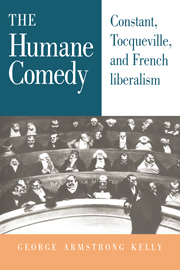2 - CONSTANT VERSUS TOCQUEVILLE
Published online by Cambridge University Press: 31 March 2010
Summary
SOCIAL SETTINGS OF THE POLITICAL SELF
As the conclusion to the last chapter suggests, the relation of the individual and private citizen to the opinions of society and the powers of government is one of the chief modes by which the political theories of Constant and Tocqueville are to be distinguished. An expanded domain of the self combined with a normative supremacy of public opinion had, for the most part, characterized the philosophical project of the eighteenth century. Constant, while greatly sobered by revolution and reaction, is obedient to this idea. For him, these goals are in harmony. Liberal politics is fundamentally a safeguard of the educable inner capacities of the human being and their outward projection as expressive rights. Tocqueville is disabused of that simplicity. He does not deny Constant's priority of “liberty against” (for he, too, has a “garantist” view of political authority), but he fears the unstable context of uniformity that democratic self-disclosure has helped to create, a liberation leading to softer but stronger servitudes. “ In democratic times,” he writes, “what is most unstable, in the midst of the instability of everything, is the heart of man.” This is an instability predicated both as sameness and as separateness. Tocqueville deplores, and probably exaggerates in his aristocrat's heart, the atomization of modern, and especially post-Revolutionary, French society. Insofar as Constant acknowledges that danger, he tends to interpret it as a consequence of “despotic” residues, seeing uniformity “as the immediate and inevitable consequence of the spirit of conquest [of Napoleon].”
Terms appropriate to our inquiry such as “self” or “individual” or “individualism” have long had contested resonances.
- Type
- Chapter
- Information
- The Humane ComedyConstant, Tocqueville, and French Liberalism, pp. 39 - 84Publisher: Cambridge University PressPrint publication year: 1992



